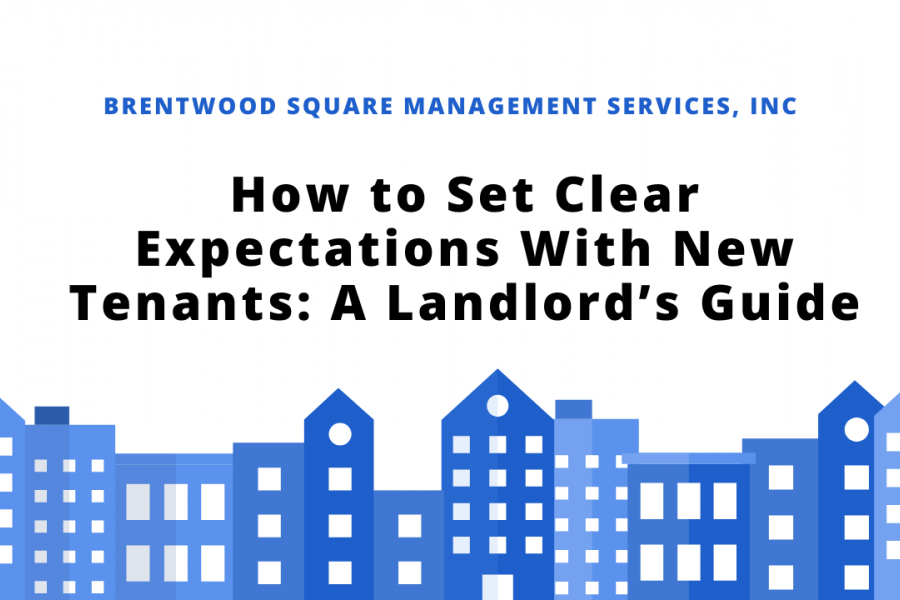
- Utilize a Detailed Lease Agreement: A comprehensive lease should clearly outline rules, responsibilities, and procedures, including rent details, maintenance obligations, and property use policies, to prevent misunderstandings.
- Provide a Tenant Welcome Packet: Supplement the lease with a welcome packet containing essential information like contact details, maintenance request procedures, and community guidelines to help tenants acclimate smoothly.
- Establish Communication Preferences Early: Discuss and agree upon preferred communication methods and response times to ensure effective and consistent interactions throughout the tenancy.
- Clearly Define Property Use Boundaries: Set explicit guidelines regarding alterations, shared spaces, smoking, pets, and outdoor areas to prevent misuse and maintain property standards.
Welcoming a new tenant to your rental property is an important step in the rental process. It’s a chance to build a strong landlord-resident relationship, one that is based on trust, communication, and mutual respect.
One of the best ways to lay the foundation for a successful tenancy and retain a tenant over time is by setting clear expectations from the very beginning. This proactive approach helps avoid misunderstandings, reduces conflict, and ensures a smoother experience for both you and your tenant.
Let’s explore effective strategies for setting clear expectations with new tenants and why it matters to your long-term success as a landlord.
At Brentwood Square Management Services, we believe that clear communication from the start lays the foundation for a smooth and profitable rental experience. Keep reading to learn more!
Why Setting Expectations Matters
Many of the problems that arise between landlords and residents can be traced back to a simple lack of communication.
When expectations are unclear or unspoken, assumptions fill the gap. These assumptions can lead to missed rent payments, neglected maintenance responsibilities, improper use of the property, and friction between neighbors.
Establishing expectations upfront helps both parties feel confident about their roles. Tenants understand what is expected of them, and landlords have a reference point for enforcement. It also reinforces a sense of professionalism and respect.

Start with a Detailed Lease Agreement
The lease agreement is your most important tool in setting expectations. This legally binding document should outline all key rules, responsibilities, and procedures, including:
- Rent amount and due dates
- Late fees and grace periods
- Maintenance responsibilities
- Pet policies
- Noise regulations
- Guest policies
- Move-in and move-out procedures
Take time to review the lease agreement with your tenant during the move-in process. Clarify any terms they don’t understand. Walk them through the important clauses so they know where to look if they have questions later.
Create a Tenant Welcome Packet
A lease may contain the essentials, but a welcome packet goes a step further. It can help set the tone for the tenancy and provide practical resources. A well-organized packet might include:
- A copy of the signed lease
- Contact information for emergencies and routine maintenance
- Trash and recycling pickup schedules
- A guide to using appliances or systems in the home
- Instructions for submitting maintenance requests
- House rules and community policies
Providing this upfront information reduces uncertainty and helps new tenants settle in faster.
Discuss Communication Preferences
Effective communication is the backbone of a positive rental experience. From the outset, make sure your tenant knows the best way to reach you. Do you prefer email, text, or phone calls? Are there specific hours they should contact you?

Likewise, let tenants know how you will send important notices. Whether it’s through email, door postings, or a tenant portal, consistency is key.
Encourage questions and feedback. When tenants feel heard, they’re more likely to take good care of the property and meet expectations.
Set Boundaries Around Property Use
Another area where expectations should be clear is property use. Outline what is and isn’t allowed. This includes:
- Alterations to the property (painting, mounting shelves, etc.)
- Use of shared spaces (for multi-family properties)
- Smoking rules
- Pet rules
- Guidelines for landscaping or outdoor areas
Being upfront about these expectations can prevent surprises and help tenants make responsible decisions.
Clarify Maintenance Responsibilities
Tenants often assume landlords handle all repairs, but that’s not always the case. Clarify which tasks are theirs and which fall under your responsibility. For example, tenants may need to:
- Replace lightbulbs
- Maintain smoke detector batteries
- Report issues promptly
- Keep the property clean and sanitary
Be clear about timelines for maintenance requests and what qualifies as an emergency. Putting this in writing eliminates guesswork.
Talk About Rent Payment Expectations
Rent-related issues are one of the most common points of friction. To avoid confusion, clearly communicate:

- When rent is due and how it should be paid
- What happens if it’s late
- The grace period, if any
- Accepted payment methods
- What fees will be charged for bounced checks or failed transactions
Make sure your tenant understands the consequences of nonpayment, but approach the topic professionally and respectfully.
Encourage Open Dialogue
Make it easy for tenants to come to you with questions or concerns. A landlord who is approachable and responsive often finds that tenants are more cooperative and respectful in return.
Open dialogue also gives you a chance to address issues early before they become serious problems. Whether it’s a noise complaint, maintenance concern, or confusion about a policy, encouraging honest communication goes a long way.
Reinforce Expectations with Periodic Check-Ins
Even after the move-in process, it’s good practice to check in periodically. These don’t need to be formal inspections. A quick message to see how things are going or a reminder about seasonal maintenance tasks (like HVAC filter replacement or keeping up with curb appeal) can reinforce your expectations and show you care about the property.
These small touchpoints help build trust and may also reduce turnover, since tenants feel supported.
The Benefits of Working with a Professional Property Management Company
If managing expectations sounds time-consuming, that’s because it can be. That’s where a professional property management company adds value. These experts have systems in place to streamline move-ins, onboard tenants smoothly, and communicate policies clearly.
A reputable property manager can:
- Create detailed lease agreements
- Conduct orientations
- Handle rent collection and enforcement
- Respond to maintenance requests
- Mediate disputes
They also stay updated on local rental laws and fair housing regulations, helping you avoid legal issues. By taking the lead on communication and operations, a property management company ensures your expectations are not only communicated but consistently enforced.
Bottom Line
Setting clear expectations with new tenants isn’t just a best practice, it’s essential for a stress-free and professional rental experience. By being proactive, transparent, and approachable, you encourage your tenants to be the same.
And if you prefer to delegate this task, working with a trusted property management company can help ensure your standards are upheld while saving you time and energy.
Call us at Brentwood Square Management Services if you need help.
